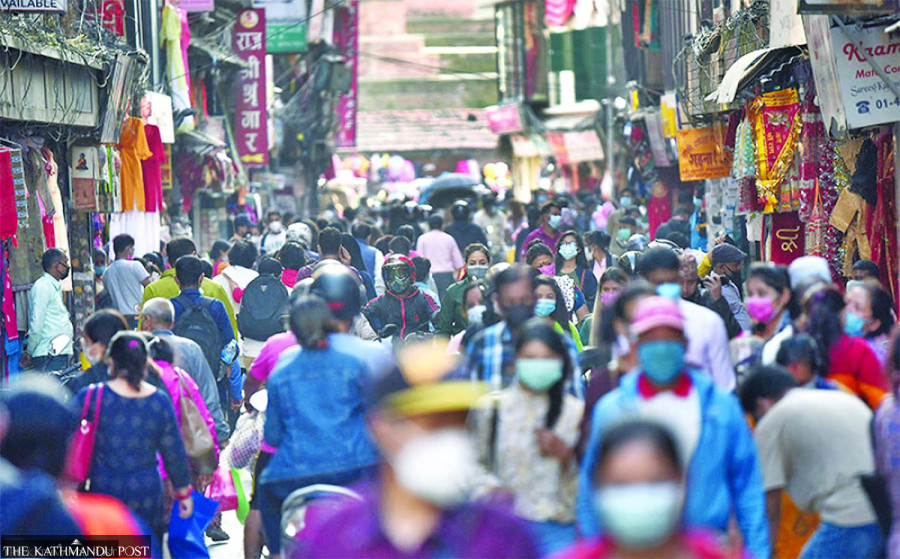Money
Manufacturing and business shudder as virus resurgence threatens recovery
Another lockdown would be disastrous when the economy is starting to rebound from two years of despair, insiders say.
Krishana Prasain
The emergence of a new variant of the coronavirus has cast a pall over Nepal's manufacturing and business sectors as it threatens to put the brakes on Nepal's slowly recovering economy.
Following reports of the Omicron virus appearing around the world, trade and industry leaders are concerned that another infection surge could prompt crippling lockdowns, just as the economy is starting to rebound from two years of despair.
Dinesh Shrestha, vice-president of the Federation of Nepalese Chambers of Commerce and Industry, said that the new variant had started worrying the private sector.
“The government needs to start acting promptly,” he told the Post. “Nepal cannot afford to bear another lockdown now.”
The private sector has suggested strict inspection at all land entry points and the international airport to prevent the new variant from passing into the country.
The Omicron virus has been detected in India with two people in Karnataka testing positive for the new variant, according to reports.
And it is spreading. The virus has so far been detected in Australia, Austria, Belgium, Botswana, Brazil, Canada, Denmark, France, Germany, Hong Kong, Israel, Italy, Japan, Netherlands, Nigeria, Norway, Portugal, Saudi Arabia, South Africa, South Korea, Spain, Sweden, the United Kingdom and the United States.
Nepal has suffered two lockdowns—first on March 24, 2020 that continued till July 21, and a second lockdown on April 29, 2021 that continued until September 1.
With the entire population confined to their homes and businesses shut down for months on end, the economy disintegrated, and Nepal recorded its first economic contraction in nearly four decades in the fiscal year 2019-20. The economy contracted by 2.1 percent.
Covid-19 has killed 11,535 people in Nepal.
The country’s business activities, except the tourism industry, were on track to recover with 87.2 percent of businesses and industries resuming full operation as of October.
A recent follow-up survey on the impact of Covid-19 on the economy published by Nepal Rastra Bank showed that transactions and production in the agriculture, forestry and fisheries sectors had reached 79.3 percent of previous levels.
The minerals and exploration sector and the electricity, gas and water sector have made the fastest recovery, and enterprises in these sectors are now 100 percent open, the survey showed.
The latest survey reveals that 78.7 percent of hotels and restaurants are fully opened, while 21.3 percent are partially open.
The construction industry reported 88.9 percent of the sector was fully open while 87.1 percent of manufacturing was fully open compared to pre-Covid levels.
The World Health Organisation on November 28 said that it was working with technical partners to understand the potential impact of the new variant on its existing countermeasures, including vaccines.
But health experts are clueless whether the existing vaccination against Covid-19 will work against the new variant, Omicron, a highly contagious variant of SARS-COV-2. The World Health Organisation on Friday declared the new coronavirus variant to be “of concern”, the same category as the highly transmissible Delta variant.
Nepal’s business community is worried that the new variant could compel the government to impose lockdowns as a quick measure to contain possible transmission.
Economist Keshav Acharya said, “There is news that the new variants are highly transmissible and the existing vaccines do not work on them. We still do not know what will happen. It’s uncertainty again.”
Case loads involving the new variant are increasing globally, particularly in Europe, the United States, Latin America and Africa. "Though the government has stopped flights from African countries, there are no chances that new variants will not arrive here," said Acharya.
“If the new variant comes and takes the lives of people including young ones like in the second wave of Covid-19, it will have negative impacts in many respects,” Acharya said.
The market and the government have not reacted to reports of the new variant that was first detected in South Africa.
According to Reuters, oil prices tumbled on November 30 after Moderna’s chief doubted the efficacy of Covid-19 vaccine against the Omicron coronavirus variant, spooking financial markets and heightening worries about oil demand.
The country’s economic indicators are already not in a good position with increasing imports, depleting foreign exchange reserves, negative growth of remittance and lack of budget expenditure, economists said.
A rise in fuel prices, increases in global shipping charges and an appreciating dollar have been hitting the domestic market with inflation in both food and non-food goods.
Acharya said that government resources would again need to be mobilised in the health sector, socio-economic infrastructure would fall in the priority list, and economic activities would contract.
“And if the government imposes a lockdown again to control the spread of the new variant, the resulting contraction in economic activities will lead to an increase in unemployment, reduction in production, revenue losses to the government, inability to repay bank loans, and a jump in imports of essential goods,” he said.




 13.12°C Kathmandu
13.12°C Kathmandu













